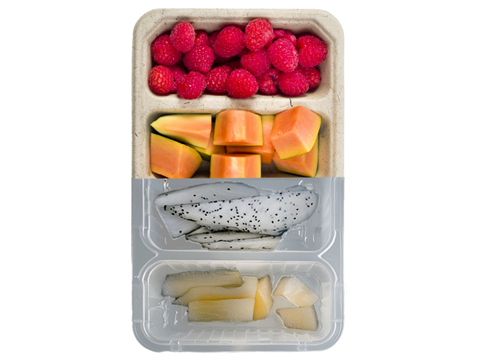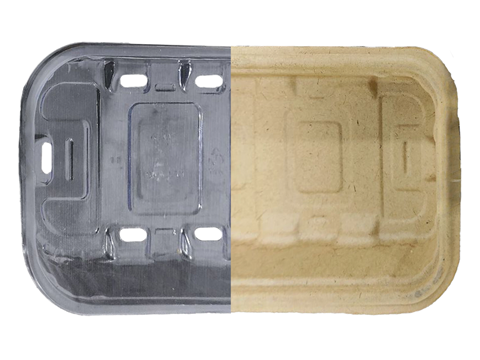
Ahead of this year’s Sustainability Awards, we spoke to finalist COPAR about its wheat straw packaging, nominated in the Pre-Commercialized Renewables category and aiming to offer a compostable and recyclable alternative to traditional plastics.
You’re a finalist in the Sustainability Awards 2024. Congratulations! To start off, could you summarise your entry, in less than 50 words?
COPAR’s wheat straw packaging offers compostable and recyclable alternatives to traditional plastics for food, meat, fresh produce, ready-to-eat, and healthcare industries, aligning with Australian and UK regulations.
Why do you think the judges were impressed with your entry? Tell us about what is innovative about your project and/or its impact on packaging sustainability.
COPAR’s wheat straw packaging is a groundbreaking solution aimed at reducing environmental impact within the food service, meat, fresh produce, ready-to-eat, and healthcare industries.
Our wheat straw packaging is made from agro-waste and contributes to a closed-loop solution by turning into nutrient-rich compost after use, enriching the soil instead of polluting it. This approach reduces waste in landfills and minimizes the carbon footprint associated with traditional packaging materials.
The process of turning wheat straw into high-quality packaging results from extensive research and development involving close collaboration with farmers and the University of Newcastle, Australia.
What makes our innovation significant is its ability to replace plastics without compromising on the performance standards that industries and consumers expect. Our packaging is robust, resistant to water, oil, and grease, and capable of protecting products as effectively as conventional materials.
Our meat and ready-to-eat packaging are also Modified Atmosphere Packaging (MAP) compliant. Our products have no Per- and polyfluoroalkyl substances (PFAS) added, ensuring they are safe for both people and the planet.
The development process involved extensive research with the University of Newcastle, Australia, to ensure the packaging’s compostability and recyclability without compromising on quality or usability. Our packaging will be made in Australia in our Bathurst facility which maintains a zero liquid discharge policy.
Our wheat straw packaging breaks down into nutrient-rich soil in a compost environment. In collaboration with a small-scale industrial in-house composting solution, ‘Foodie’, our wheat straw packaging composts in less than 24 hours, and our bio bags compost in 48 hours.
In the UK, COPAR’s wheat straw packaging has been certified as recyclable by the Confederation of Paper Industries (PaperCycle) and is recognised by the OPRL. In Australia, we are in the process of obtaining certifications according to Australian standards for both home and industrial compostability.

Finally, can you tell us about the ongoing development of your project, e.g. how your innovation/initiative has been received by the industry, or what the next steps are in commercialization/product development?
COPAR’s wheat straw packaging has been enthusiastically received by the industry, garnering interest and inquiries from markets in the USA, UK, and Australia. Our ability to offer custom packaging solutions through our in-house design team has been a significant advantage, allowing us to cater to the specific needs of various sectors.
Our other recent innovations include compostable pot plant carriers for all-purpose pots and plant ready pots currently being developed by the COPAR team in India, targeting the nursery and plant markets in the US. We also offer full recyclable and compostable ready-to-eat meal trays.
We offer hyperbarrier paper as a packaging solution - a nanocomposite coating for paper-based packaging which can offer 20 times the oxygen barrier and 15 times the moisture barrier compared to PE coating. This material is being tested for our thermoformed wheat straw trays for meat, providing superior protection while being eco-friendly, as well as flow wrap and semi-rigid applications that replace single use plastics.
The next steps in our commercialisation and product development include expanding our production capabilities, obtaining further certifications for our products and continuing to explore new applications for our sustainable packaging solutions.
The winners of the Sustainability Awards 2024 will be announced at the Sustainable Packaging Summit, taking place in Amsterdam on 12-13 November. The Summit mobilizes leaders of the FMCG value chain, policymakers, NGOs, recyclers and investors to collaborate, remove barriers and identify opportunities on the road to sustainable transformation.
To learn more or register, visit: https://www.packagingsummit.earth/2024
If you liked this story, you might also enjoy:
How are the top brands progressing on packaging sustainability?
Sustainable Innovation Report 2024: Current trends and future priorities
Reuse vs. single use – which is better for the environment?
The ultimate guide to global plastic sustainability regulation














No comments yet